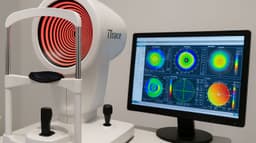
How To Fix Cloudy Vision After Cataract Surgery
Why is my vision getting worse after cataract surgery?
The surgical treatment of cataracts is a life-altering operation that restores vision and enhances the standard of life for countless people. However, some individuals may experience a decline in or blurry eyesight following surgery, which can be troubling. In this article, we will look at the causes of this phenomenon as well as one of the most effective treatments available: YAG laser treatment. Join us as we investigate the reasons for foggy vision following cataract surgery and learn how the YAG laser may assist in restoring brightness to your vision.
Understanding Cloudy Vision after Cataract Surgery:
Posterior Capsular Opacification (PCO):
Posterior capsular opacification (PCO) is the most prominent cause of blurry vision after cataract surgery. When the thin film that keeps the artificial lens secure becomes hazy or thickens in time, this happens. PCO can produce impeded or foggy vision, which is similar to the symptoms of cataracts.
Residual Refractive Errors:
Patients may have hazy vision in some circumstances as a result of remaining refractive errors that hadn't been entirely repaired during the first surgery. These defects, which include farsightedness, near-sightedness, and astigmatism, can have an effect on the overall accuracy and quality of vision.
YAG Laser Treatment
A Game-Changer for Cloudy Vision:
Fortunately, YAG laser capsulotomy is an efficient and minimally invasive treatment for clouded vision after cataract surgery. This innovative technique was developed exclusively for the treatment of PCO and is capable of restoring clear eyesight in just a couple of minutes.
Hazy Vision After Yag Laser
Hazy vision after a YAG laser capsulotomy is a possible but generally temporary side effect. This procedure is commonly performed to treat posterior capsule opacification (PCO), a condition that can occur after cataract surgery when the lens capsule becomes cloudy. The YAG laser creates an opening in the cloudy capsule, restoring clear vision. However, some patients may experience hazy or blurry vision immediately following the procedure, typically due to mild inflammation or the presence of floating debris in the eye. These symptoms usually resolve on their own within a few days. If hazy vision persists, it’s important to consult your surgeon, as they may prescribe anti-inflammatory eye drops or other treatments to help clear up the vision and ensure the best possible outcome.
How YAG Laser Capsulotomy Works:
A specialised laser is used to create a tiny opening in the clouded posterior capsule, enabling light to flow through unobstructed. The laser is carefully directed to the afflicted region, with no incisions or stitches, resulting in a painless and quick process.
Advantages of YAG Laser Capsulotomy:
Rapid Improvement:
The outcomes of YAG laser capsulotomy are frequently instantaneous, with patients observing a considerable improvement in vision shortly following the treatment. YAG laser capsulotomy is a non-surgical technique that may be performed as an outpatient procedure. It does not require any incisions or stitches, which reduces the possibility of discomfort or healing time.
Long-Term Effects:
When the clouded posterior capsule is treated with a YAG laser, the eyesight typically improves permanently. There is no need for additional PCO treatments or procedures.
Consultation with Your Ophthalmologist
If you have foggy vision following cataract surgery, it is recommended that you see your ophthalmologist or eye care specialist. They will assess your particular circumstance, identify the underlying reason for your foggy vision, and establish the best course of therapy, which may involve YAG laser capsulotomy.
For expert eye care treatment, contact our dedicated team at My-iClinic on 0208 445 8877. Our laser surgeons are here to help mitigate PCO symptoms after cataract surgery with our state-of-the-art YAG laser treatment.
Find out more by Speaking to our team









